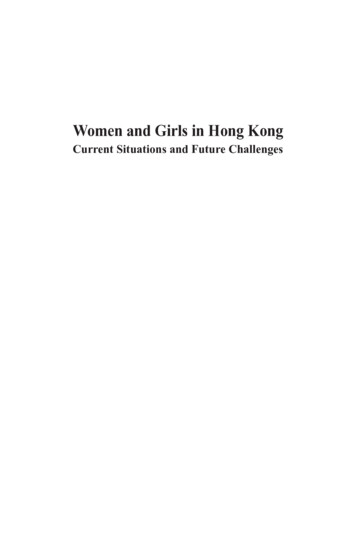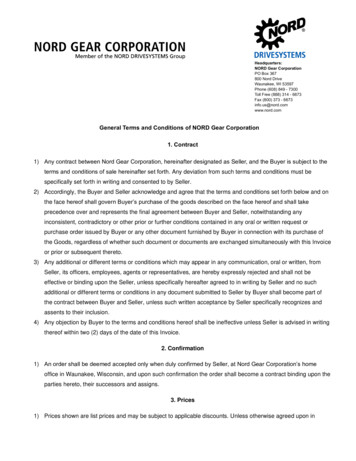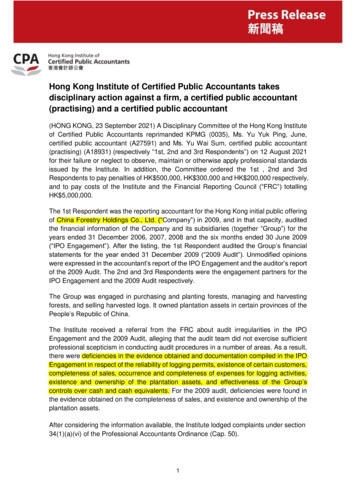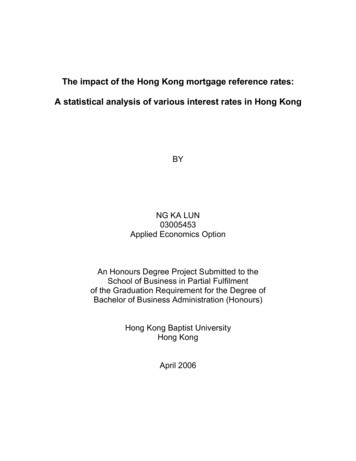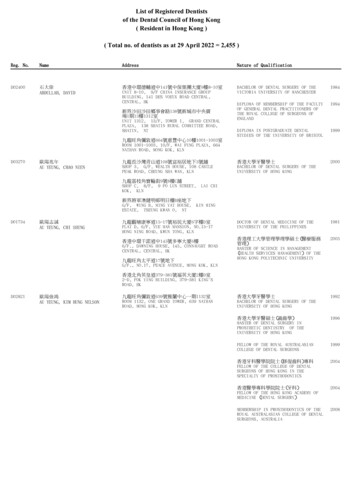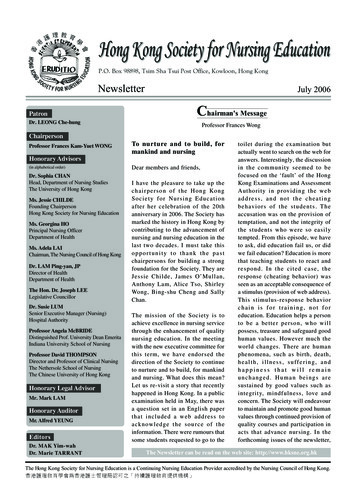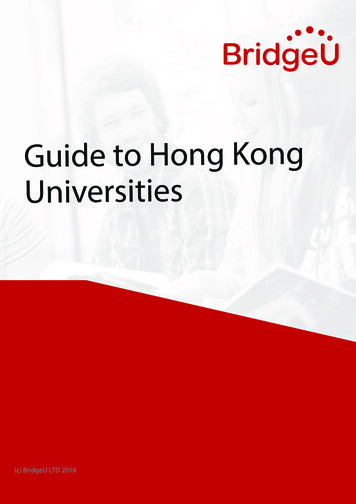
Transcription
Guide to Hong KongUniversities(c) BridgeU LTD 2018
Hong Kong Universities: In a Nutshell High-ranking globallyInternational cohortsApply directly to the courseFocused on specific subjects/ disciplinesWorld-leading research departmentsTable of Contents1.2.3.4.5.6.7.8.Application OverviewWhy Study in Hong Kong?Different Types of DegreeUnderstanding Entry RequirementsHow Courses Are DifferentSpecial SubjectsDifferent Types of UniversityUnderstanding League TablesPage 3
Why Study in Hong Kong?Quick OverviewHong Kong has been striving to become an international education hub. Therefore, HongKong higher education institutions have been taking measures to welcome internationalstudents. It recently increased the quota for international students at undergraduate levelto 20% of the enrollments. There are a total of around 40 institutions.The education system is largely modelled on the UK system, although the undergraduateprogrammes are more of a mix of UK and US systems. In fact back in 2012 undergraduateprogrammes at public universities moved from a three-year specialized focus system,similar to that of the UK, to a four-year holistic, student-oriented model similar to that ofthe US.Besides being one of the best cities in the world for students, in Hong Kong you can findquality post-secondary institutions and you can pick different pathways to pursue yourpost-secondary goals.Studying in Hong Kong gives you immersion in Chinese (particularly Cantonese), culturewhile still being able to share your experience with many other foreign students, withEnglish spoken by most people.High Quality EducationHong Kong has both the highest-ranked Asian universities in the QS WorldUniversity Rankings (Hong Kong University and Hong Kong University of Scienceand Technology). It also has 6 universities in the QS top 300, so for a small place,it’s a higher education powerhouse!Connectivitiy & travel opportunitiesStudents report at least 90% satisfaction with their experience in the UK. The UKhas the highest international student experience satisfaction ratings for English-speaking countries. The UK is popular with international students from allover the world.Melting pot of cultureHong Kong attracts people from all over the world and is a melting pot ofChinese, Asian and Western cultures, with truly something for everyone. It is acosmopolitan highly moden city, with historical colonial buildings, beautitfulcountryside, and culturally significant temples.Page 4
The Admissions ProcessCalendarThe application calendar of Hong Kong institutions varies greatly across institutions, faculties,departments or even individual programmes. For studies beginning in the autumn term (September), application deadlines may fall as early as November the year before, or as late as Mayin the same year you plan to start your studies. In addition, some institutions will organize theapplication process by application rounds such as ‘early’, ‘main’ and ‘late’ rounds.You should check on the individual University’s website which round(s) apply to internationalstudents. In some cases, the early round is dedicated to international students’ only. But someinstitutions may offer late applications for some of their programmes.Hong Kong AdmissionsT I M E L I N EThis graph gives you an overview of theapplication process for Hong Kong. Note thatevery university is different, so you’ll need tocheck deadlines and requirements on theuniversity website and make sure they applyto your programme.UNIVERSITYOPTIONS01MAKE YOUR CHOICESelect the institiutions that best suityour personality and goals. Remember,this will be your community for thenext 3-4 years, so do your research andtalk to people if possible!STARTING POINTGET TALKING TO THEMContact the institutions to get morespecific information regardingadmission requirements, deadlines andprogramme-specific criteria - confirmwhat paperwork you'll need to do ANDwhen you need to submit it02CONFIRMREQUIREMENTSSUBMITAPPLICATION03SEND REQUIREMENTS TO HONG KONGSubmit your application to theprogrammes you have chosen, ensuringto get all the documents to theuniversity by the deadline.RESPOND TO OFFERSACCEPT/ REJECT OFFERSATTEND INTERVIEWSSome institutions may invite you forinterview before deciding whether ornot to make an offer. This can beconducted in person or via a videoconference call.04Page 5You may get more than one offer fromdifferent institutions/ programmes inHong Kong. Take your time (but makesure to respond by the deadline!) andmake the right decision for you.
Universities in Hong KongHong Kong’s higher education institutions are divided into publicly-funded and self-financed institutions. Self-financing educational programmes refer to sub-degree level programmes (see an explanation of sub-degress on the next page!) provided by local self-financing entities. Publicly funded degreeprograms tend to have a better recognition in the job market, which is why often local students opt toundertake a sub-degree program at self-financing institutions to then subsequently seek admission topublicly-funded universities.Public UniversitiesCity University of Hong Kong (#55) similarly ranked include: Brown University (#56), University of Warwick (#54)Hong Kong Baptist University (#277) similarly ranked includes: Rutgers University- New Brunswick (#283)Lingnan University (#601-650) similarly ranked include: University of Manitoba, Sichuan UniversityChinese University of Hong Kong (#49) similarly ranked include: UNSW Sydney (#45), University of Bristol (#51)Hong Kong Polytechnic University (#106) similarly ranked include: Trinity Dublin (#104), Yonsei University (#107)Hong Kong UST (#37) similarly ranked include: Kyoto University (#35), Nothwestern University (#34)University of Hong Kong (#25) similarly ranked include: Duke University (#26), Australian National University (#24)Not in QS global rankings include:The Education University of Hong KongHong Kong Academy of Performing Arts (funded directly by the government)Self-Financing UniversitiesThere are 12 degree-granting instituations which are self-financing (meaining they receive no public funding).These institutions tend to be more vocationally focused, and less academically renowned world-wide comparedto the publicly-funded instituions. Examples include: Hang Seng Management College, HKCT Institute of HigherEducation, The Open University of Hong Kong, VTC (Vocational Training Council) and Yew Chung College of EarlyChildhood Education, among others.The University of Hong Kong (“HKU”)#25 QS Global Ranking; #5 Asian RankingsHKU has an established reputation as one of the best universities (if not *the* best) in HongKong. With a wider variety of courses and programs compared to HKUST, HKU’s campus is inthe center of the city on Hong Kong Island. 7K undergraduate students 1.5K international undergraduate students 1.4K total staff 16-18K annual tuition feesfor international studentsPage 6
Profiles of Top Ranked UniversitiesHong Kong University of Science and Technology (“HKUST”)#37 QS Global Ranking, #3 Asian RankingsHKUST is world-renowned for its MBA and business degrees. More specialist than otheruniversities in Hong Kong (STEM subjects and business-focused), HKUST has a reputationfor cutting-edge facilities and strong graduate job opportunities. 13K undergraduate students 3.8K international undergraduate students 3K total staff 16-18K annual tuition feesfor international studentsThe Chinese University of Hong Kong (“ChineseU” or “CUHK”)#49 QS Global Ranking, #10 Asian RankingsChineseU has a reputation as a strong local option, with less diversity within their international student population compared to HKU and HKUST. ChineseU has a comprehensivestrong academic reputation and some specialist programs that it is particularly known for. 15K undergraduate students 4K international undergraduate students 2.3K total staff 18-20K annual tuition feesfor international studentsCity University of Hong Kong (“CityU”)#55 QS Global Ranking; #8 Asian RankingsWhile this universitiy is not in the ‘big three’ (Hong Kong University, HKUST and Chinese University), for a newer university (established in 1994), CityU is building a strong reputation for itsresearch, and is increasingly competitive with top universities around the world. 7K undergraduate students 1.5K international undergraduate students 1.4K total staff 14-16K annual tuition feesfor international studentsHong Kong Polytechnic University (“HK PolyU”)#106 QS Global RankingHK PolyU is located in Hung Hom, in Kowloon and has built a strong research and teaching reputation,despite not being in the top 3. The largest public university, PolyU is longer established than CityU (forexample), it may currently be more recognized by employers. PolyU boasts 20% of all students comingfrom 30 different countries. 14-16K annual tuition feesfor international studentsPage 7 15.5K undergraduate students 2K international undergraduate students 2.5K total staff
Degree OptionsColleges or Faculties within a UniversityDepending on the university, you may apply to a particular college relating to your studies. For example, atCityU, you apply to:1. College of Liberal Arts and Social Sciences2. College of Science and Engineering3. College of Business4. School of Creative Media5. Jockey Club College of Veterinary Medicine and Life Sciences6. School of Energy and Environment7. School of LawTo take another example, the University of Hong Kong has (to name just a few), the Faculty of Arts, the Facultyof Business and Economics, the Faculty of Dentistry and the Faculty of Education.Admissions to a DepartmentLike the system most associated with the US, Hong Kong enables you to apply to a department and then, insome cases, choose a major after the first year of study. This means you can allow yourself a bit of flexibility ifyou’re not completely sure which pathway is right for you.Admissions to a Major/ Program or Joint ProgramRather like the traditional UK university system, you can apply directly to a program (or joint program) of study,or choose a major at the point of applying. For example, at CityU, instead of applying to the Department ofEconomics and FInance, you can apply directly to the Business Economics major.Sub DegreesA ‘sub-degree’, similar to foundation degrees in the UK, or community college degrees in the US, arealso known in Hong Kong as Associate Degrees (AD) or Higher Diplomas (HD). These are lower levelthan batchelor’s degrees, and are intended to prepare students for further studies and initial employment. AD and HD are of equal standing in terms of level, (i.e. Level 4 of the Hong Kong QualificationsFramework). They equip students with generic skills, knowledge in specialized disciplines and practicalvocation skills.If Sub Degrees look like a possible fit for you, it’s worth considering their benefits: They encourage you to develop the ability to learn how to learn (learnability), They encourage you to pursue active citizenship. They nurture the necessary attitude, knowledge and skills that facilitate you to join the workforceat the para-professional (people who are trained to assist professionals, but do not tehmselveshave a professional license) level.The main difference between them is that AD puts more emphasis in general education while HD ismore vocational. Associate Degrees provide you with a broad knowledge base and a solid foundationof generic skills, while Higher Diplomas enable students to pursue a career in a specific field.Page 8
Worksheet: Compare Programs & UnisIf you already know what you want to study and have a shortlist of universities or programsyou like, you may not have a considered how different the courses can be!Course 1Course nameOpportunities to study abroad?Frequency of seminars/ tutorials?Size of seminars/ tutorials?Mode of assessment(coursework vs. exams)?Frequency of lectures?Frequency of practicals?Fieldwork assignments?Page 9Course 2Course 3
Admissions CriteriaAdmissions criteria vary greatly across different institutions and programs. Therefore, we highly recommend that you establish contact with the institutions and programs that interest you to ensure youknow exactly what’s expected of you.Academics You will need to have completed secondary/ high school (or be aboutto!) with predicted grades in an official transcript.You’re expected to achieve strong grades (Hong Kong being one of themost selective countries in the world in terms of academic grades). Anexample of this is HKUST for an IB student is: mid 50% Score Range for2017 Intake: 36 – 40 (including bonus points)WARNINGTthe minimum requirements listed may be low(i.e.: IB 24, or 3 passes inA Levels), but the competition is stiff, so don’t belulled into a false sense ofsecurity!Language Tests If you are applying for a course taught in English and it has not been your medium of instruction,you may need to take the TOEFL (Test of English as a Foreign Language), IELTS (International English Language Testing System), or equivalent examinations, usually to a standard of TOEFL 550-600(or 79 internet-based) or IELTS 6 - 6.5.You may need to demonstrate evidence of proficiency in another language (this may be requiredto be Chinese in some cases, but not all).Personal StatementThe most competitive universities (University of Hong Kong, HKUST, ChineseU) require a personalstatement as part of your application.This gives the faculty assessing your application their most significant impression of you as an individual. This section is the key to distinguish your application fromother suitable candidates - to stand out from the crowd of others with exceptional academics! On thenext page, we’ll go into detail on what the personal statement should include, but remember thatyou should contact your chosen university to find out what they are looking for, as they may changewith time and differ according to the subject you’re applying to.Referee’s ReportThis is completed by your high school principal, or a teacher who knows you well. It covers yourachievements, interests and personality, and asks the teacher to assess you in terms of analyticalskills, language skills (oral, written), initiative and independence of thought, industry and perseversance, reliability and responsibility. It also asks the referee to comment on positions on responsibilityheld by the applicant, as well as extra-curricular activities participated in (both within and outside ofschool).Additional Requirements You will likely be asked to pay an application fee. This is typically 60 (or HK 450) for up to 3 program choices. You may also be asked to pay for the first year’s tuition up front to secure your spot(this is currently the case for ChineseU, costing HK 10,000).You may need to prove your proficiency with a second language (not necessarily Chinese!).SAT scores (some universities such as HKUST require this at 1290 or higher), but this isn’t requiredby all universities in Hong Kong.Page 10
The Personal StatementEvery Hong Kong university is different in how they treat the personal statement. In fact, even wtihina university, the personal statement may be required, optional or not required. Typically, if required, itshould be confined to two-page A4 size, but you may not have a specific word or space limit.StructureParagraph 1Make it clear what you’re applying to and open with your enthusiasm for the university and faculty.Paragraph 2Introduce your personal interest in the program you’re applying for, and establish (with evidence!)your readiness for study and how you believe you will benefit from it.Paragraph 3Describe your academic background and achievements. Highlight evidence of strong academic andpersonal qualities both from your school and activities you have participated in outside the classroom.Paragraph 4Link your academic experience to any relevant internship, voluntary or work experience. Mentionany examples of personal development (i.e. ways in which you have shown resilience and perseverence), and highlight any relevant awards you have won.Top Tips1. Make a Personal RoadmapMake sure the statement ‘flows’ and tells a clear story of why you’re applying, why you’re the best fit forthe subject, and where you think it’s going to take you.2. Be HonestDon’t lie about or exaggerate your achievements - it’s likely to be found out, and then you’ll be disqualified. It’s not worth it!3. Remember Your AudienceThe person reading your statement is likely to be an expert in your chosen area of interest. They’ll wantto know whether you’re someone they want to teach, so everything you say should link back to answering that question for them. This means, why you want to study the program and why you believe you’reready for the challenges and demands of university education.4. Check and Check AgainDon’t rely on spellcheck - make sure you proof read your work several times before you submit it. A statement with grammar, punctuation or spelling errors can make a negative impression on the admissionsperson and look careless or unskilled.Page 11
LifestyleEast Meets WestHong Kong is a diverse, vibrant and multicultural city. You will be able to experience a unique blend of cultures and lifestyles. The Chinese majority forms the core of the local culture, but Hong Kong has a foreign population of about 500,000from different parts of the world, both students and long term expats. While it’s a melting pot of people from all over, thelargest countries of origin are Indonesia, the Philippines, the UK, the US, Thailand, India, Japan, Australia, Pakistan and Nepal. You should learn from Cantonese, but you will also be able to navigate the place by speaking in English, and if you havethat craving for western food and products, you will always find options. Hong Kong is also extremely easy to explore withits modern network of cheap transport - there’s no excuse for not getting to know each corner!The City That Never Sleeps. With Something for EveryoneWith a population of almost 7 million, Hong Kong is one of the most densely populated places on earth. It can bevery busy and fast-paced, but it will also offer you the chance to unplug. Many people don’t realise that the majority of Hong Kong’s territory is green nature with plenty of serene hiking and sea bathing opportunities. Hong Konghas something for nature lovers, something for foodies, something for arts and theatre people - it’s a tissue of minicommunities who come together from all over and, with the city being relatively transient, communities are oftenopen and ready to meet new people.Let’s Go Travel!Hong Kong can also be seen as the launchpad for Asia - every part of the region is easily accessible through affordable flight options and, in some cases, sleeper trains. It’s a wonderful excuse to backpack around South EastAsia, explore China and pursue other study-related or extra-curricular interests in new environments.Page 12
Student ServicesFacilities & Services Provided by the UniversityMost universities in Hong Kong provide comprehensive services for their students. These can range from catering facilities,to sports facilities, to medical facilities and much more. The cost of these services is low (a doctor appointment at your University’s clinic can cost as low as HK 15 (US 2), including medicine!Campuses provide also spaces for several student associations and actively promote students’ socialization and extra-curricular activities. With little effort, you can easily fill your schedule with interesting social and educational events on campus.AccommodationOn-campus AccommodationIf you want to save money and commute time, on-campus accommodation is the best choice for you. In fact,international undergraduate students are often offered hostel places for at least two years. Unless you opt fora single room, you will be made to share a room with local students or other non-local students of the samegender.The cost for on-campus accommodation varies from institution to institution and can range from HK 5,000 toHK 15,000. As the demand for student hostels is huge, you are advised to arrange your accommodation as earlyas possible if you plan to live on-campus.Off-campus AccommodationBecause there has been a surge in the number of international students n Hong Kong in recent years, manyuniversities are not able to provide accommodation to everyone. If that’s you, don’t worry! There are alternatives- namely, private rental accommodation. It is, however, rather more expensive (between HKD 8,000 and 15,000 amonth depending on the size, location and type of accommodation). To save money you may consider sharingthe house with a few roommates. This can be a great way to make friends and ensure you keep a balance between study and socialising!Finding off-campus accommodation in Hong Kong is not easily done at a distance. You will probably have tophysically be in the city for a couple of weeks to find a place. However, there is an up-side! It’s usually very quickto move into you appartment (many are available immediately) and the process is simple and relatively painless.Cost of LivingAccommodation costs aside, Hong Kong actually has cheaper transportation, telecommunications and publichealthcare than many countries in Europe or North America. Also, you can get student discounts for many essentials, or even arts and cultural events. You will find student discounts in some restaurants too!Hence, studying in Hong Kong does not have to be expensive. Especially if you can get a spot in the studentaccommodation facilities.Health and SafetyHong Kong is a very safe place, with a very low crime rate. Yet, it is still a very big and busy city and it is not completely foreign to small crimes such as pickpocketing.If you get sick in Hong Kong, you’re in good hands. The city has some of the best healthcare in the world, at avery reasonable price.Page 13
FundingThe Hong Kong Special Administrative Region Government Scholarship FundInternational students seeking to study in Hong Kong could consider the scholarships awarded by theHKSAR Government Scholarship Fund. The fund was established to encourage outstanding local andnon-local students to pursue their studies at any of the following institutions·1. The 8 public universities in Hong Kong (including the top 3!)2. The Hong Kong Academy for Performing Arts (HKAPA).3. Vocational Training Council.The scholarship is HK 80,000 (approximately US 10,300) per year for non-local students.Universities have different budgets for international students, so it’s worth doing your research on theones that are known to have bursaries for international students.Scholarship Selection CriteriaWhen deciding if a student should be awarded the above scholarships, the institutions take into consideration the following:(a) excellent performance in academic studies;(b) recognized contribution to the institution/society;(c) demonstrated leadership and good communication skills; and/or(d) strong commitment to the Hong Kong community.Other funding opportunitiesTen targeted scholarships offered each year to first-year non-local full-time students from ASEAN countries, India and Korea who are enrolled in publicly-funded degree programmes in Hong Kong. Ten additional scholarships are offered to first-year non-local students from Indonesia and Malaysia starting,respectively, from 2016/17 and 2018/19 for pursuing full-time studies in publicly-funded degree programmes in Hong Kong.Starting from 2017/18, new scholarships funded by private donations were made available to studentsfrom selected countries/regions along the Belt and Road. For enquiries about scholarships for countriesof the Belt and Road contact the Education Bureau at hksbr@edb.gov.hk.Page 14
BridgeULONDON18-26 Suncourt HouseEssex RoadLondon N1 8LNHONG KONG4/F Cheung Hing Industrial Building12P SmithfieldKennedy TownHong KongE. hi@bridgeu.com BridgeU LTD 2018
#37 QS Global Ranking, #3 Asian Rankings HKUST is world-renowned for its MBA and business degrees. More specialist than other universities in Hong Kong (STEM subjects and business-focused), HKUST has a reputation for cutting-edge facilities and strong graduate job opportunities. 18-20K annual tuition fees for international students
